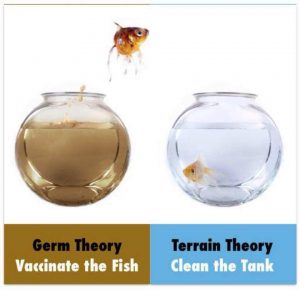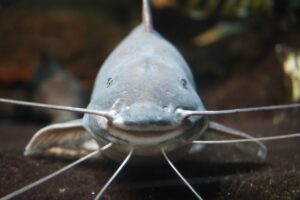
Cold water fish pose less health risks than fish living in warmer waters. So if you love fish, eat fish that live in clean, cold water.
Cold water cools down the temperature of the oceans, lakes, and streams … and this lowers the body temperature of the fish … and this prevents toxins from absorbing into the fish and into the sea vegetables, lichen, and other fish that they eat.
Our oceans are so polluted today with dirty plastics, used medical waste, and non-recycled manufactured materials concentrated within the warmer sea waters.
Fish are swimming amid these islands of human trash.
So when you eat cold water fish, you are eating a much healthier fish.
Risk of Chemical Contamination
If fish live in a polluted environment, you will wind up eating those pollutants. Heavy metals are more soluble in hot water than in cold water. Lead and zinc (commonly found in water pipes) dissolve in hot water, so when you run hot water through your pipes, lead and zinc are much more likely to leach into the water coming out of the faucet.
You should never use water from the hot water tap for drinking, cooking, or making baby formula. This applies to eating fish that live in warmer waters as opposed to cold water.
Toxic chemicals in warmer waters are made up of metallic parts that continue to corrode over time, accumulate, and contaminate the water. Warm water dissolves contaminants faster than cold water. And FYI, boiling your water does not make those contaminants (like mercury or lead) go away.
Bacteria

Vibrio vulnificus is a bacterium that commonly lives in warm seawater and is part of a group of vibrios called “halophilic” because they require salt. Vibrio vulnificus is a naturally occurring bacteria in warm, brackish seawater.
Ocean temperatures between 95°F and 115°F are the perfect environment for legionella bacteria. These water temperatures not only encourage bacteria growth, they multiply it.
Hot Versus Cold
A good Rule of Thumb is to avoid eating fresh or salt-water fish that live in water temperatures above 68-70°F.
Did you know when water temperatures get above 90-degrees in lakes, bass will stay in the water under an abundance of cover that allows the fish to hide in the shade. Bigger fish will dive deep to the bottom of lakes and in the ocean where the water is cooler.

Cold Water Fish
Cold water fish are a powerhouse of nutrition packed with protein and omega-3s. Enjoy them as part of a balanced diet to keep the pounds off.
Some cold water fish can be polluted in mercury and environmental toxins depending on what human influences are impacting their environments, but most are considered a cleaner fish, and can be consumed up to three times per week.
Here are the best cold-fish choices:
- salmon
- tuna
- Atlantic mackerel
- cod
- trout
- herring
- red snapper
- halibut
- sardines
- canned light tuna
Cold-water fish capture the essence of ocean freshness in their flavor, while warm-water fish, like catfish and tilapia, boast strong flavors that vary depending on their species, dietary habits, and human influences impacting their environments.
Warm Water Fish

Here are the most popular warm-fish that thrive in warmer waters:
- catfish
- tilapia
- bass
- bluegill
- sunfish
- yellow perch
- walleye
- grouper
- crappies
Most people enjoy catfish, but be aware that they are a dirty, warm water fish.
Fish Oils
The same train of thought applies to fish oils from cold water fish versus warm water fish.
Fish oil that has gotten too warm can be harmful to your health. Animal studies show that oxidized fatty acids can cause organ damage and inflammation. They break down quickly, increasing acidity in the stomach, which leads to fishy-burps. Free radicals produced by contaminated oils act as carcinogens.
Consider that approximately 50 fish are killed for each bottle of an Omega-3 fish oil supplement, and farm-raised and fast-growing warm water fish are typically used for this popular product. If you are using a fish oil, I recommend cold water fish oils.
Cod Liver Oil is my favorite choice because it has many health benefits and comes from wild caught, cold water fish. Fish oils are full of omega-3s that promote heart, brain, vision, joint, immune, and whole body health.
Hot or cold? When it comes to fish, I choose cold.
_______________
If you want to learn more about healthy living and disease prevention, contact me at janethull.com. Remember that you are never alone when you are looking for good health!
I look forward to supporting you on your journey to alternative health and wellness.
_____________
Disclaimer: This article is for informational purposes only, and is educational in nature. The FDA may not have evaluated some of the statements. This article is not intended to diagnose, treat, cure, or prevent any disease. Please discuss with your own, qualified health care provider before adding supplements or making any changes to your dietary program.
Before taking vitamins, consult your doctor; pre-existing medical conditions or medications you are taking can affect how your body responds to multivitamins.
You have our permission to reprint this article if you attribute us with a live back-link to this article and the youtube links. http://www.janethull.com/
_______________